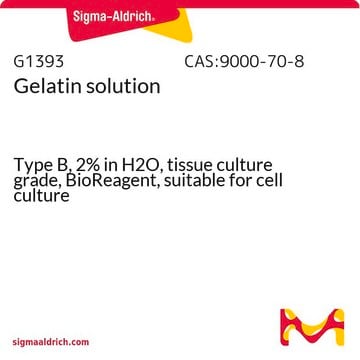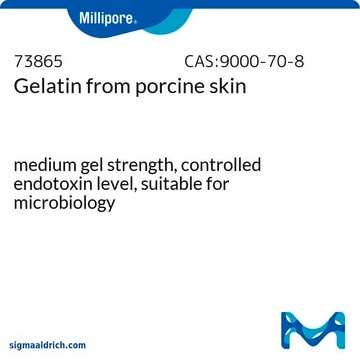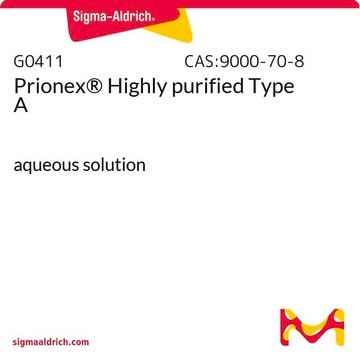G9136
Porcine Gelatin
from porcine skin, Type A, powder, γ-irradiated, suitable for cell culture, BioXtra
About This Item
Produits recommandés
product name
Gelatin from porcine skin, Type A, lyophilized powder, γ-irradiated, BioXtra, suitable for cell culture
Source biologique
Porcine skin
Niveau de qualité
Stérilité
γ-irradiated
Type
Type A
Gamme de produits
BioXtra
Forme
lyophilized powder
Conditionnement
pkg of 10 mg
Technique(s)
cell culture | mammalian: suitable
Couverture de surface
100‑200 μg/cm2
Résistance du gel
~300 g Bloom
Solubilité
soluble 20 mg/mL, clear, colorless (in warm tissue culture medium)
Conditions d'expédition
ambient
Température de stockage
room temp
Vous recherchez des produits similaires ? Visite Guide de comparaison des produits
Application
Gelatin has been used in many applications. It has use in coating cell culture to improve attachment of cells, being added to PCR to stabilize Taq DNA, as a blocking reagent in Western blotting, ELISA, and immunochemistry, and as a component of media for species differentiation in bacteriology. As a biocompatible polymer, it has used as a delivery vehicle for release of active biomolecules and in generation of scaffolds for tissue engineering applications. In the pharmaceutical industry, geltan can be used as a suspending and encapsulating agent, among other applications.
Composants
Attention
Notes préparatoires
This product is a type A lyophilized powder, suitable for cell culture, with a gel strength of 300.
Code de la classe de stockage
11 - Combustible Solids
Classe de danger pour l'eau (WGK)
nwg
Point d'éclair (°F)
Not applicable
Point d'éclair (°C)
Not applicable
Équipement de protection individuelle
Eyeshields, Gloves, type N95 (US)
Certificats d'analyse (COA)
Recherchez un Certificats d'analyse (COA) en saisissant le numéro de lot du produit. Les numéros de lot figurent sur l'étiquette du produit après les mots "Lot" ou "Batch".
Déjà en possession de ce produit ?
Retrouvez la documentation relative aux produits que vous avez récemment achetés dans la Bibliothèque de documents.
Les clients ont également consulté
Notre équipe de scientifiques dispose d'une expérience dans tous les secteurs de la recherche, notamment en sciences de la vie, science des matériaux, synthèse chimique, chromatographie, analyse et dans de nombreux autres domaines..
Contacter notre Service technique












